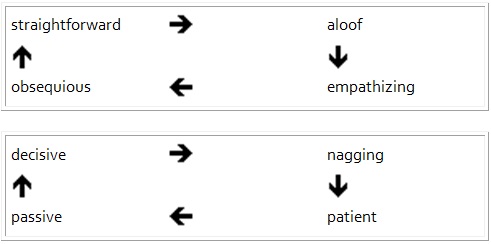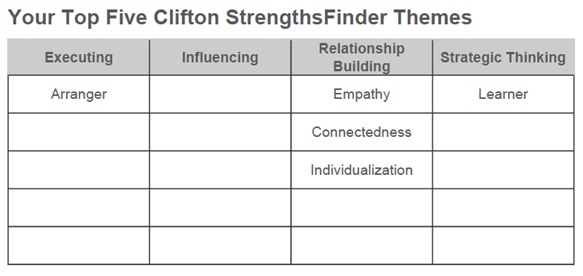Examples:
The core quality and the challenge are complementary qualities. The objective is to strike a balance between the two. If the challenge is underdeveloped, the core quality must be improved to find the balance.
Example:
It is not necessary to become less decisive, but to develop more patience, resulting in a patient decisiveness without nagging.
Or: find a balance between flexibility and orderliness.
Allergy
What is true for your Core Quality can be true for your Challenge. It can become too much.
The core qualities can also be used to identify potential conflicts with the environment. People tend to be allergic to too much of their own challenge in other persons. The allergy is ‘too much of a good thing’ of the challenge, as well as the negative opposite of the core quality.
The key word that comes with your challenge is CONTEMPT. It is something you really dislike and do not want in your life.
Lesson 1: You can learn the most from the people you are most allergic to. They have too much of something you need (your challenge).
Lesson 2: Why is it so hard for a decisive person to develop patience? Because this person believes being patient is doing nothing, being passive.
And as long as you believe this, you will never be able to develop your challenge.
Lesson 3: Your allergy gives you very sensitive antennas. You will be the first to notice an allergy.
All depends then on how you will react. Do you respond from your pitfall or from your Core Quality? Best is of course, to act from your Core Quality.
Examples:
Example of two core quadrants:
 Learning from encounters using the core quadrant
Learning from encounters using the core quadrant
-
The Whole Picture
The circle is round.
As Paula states in the article I brought up, “Focusing on weaknesses while ignoring strengths creates feelings of discouragement, failure, low self-esteem, and can even contribute to depression. Conversely, over estimating our strengths can be just as unproductive. It is only when we give equal weight to our strengths and weaknesses that we can realistically recognize our abilities and actualize our potentials.”
As is mentioned in Daniel Ofman’s theory on Core Quadrants, overdoing strengths creates a weakness. Hence, a weakness has the potential for you to discover your strength and create a goal. It can guide you towards the behavior you would love to have.
Approaching weaknesses as a coach is good! I believe in focusing on the weaknesses that are significant to the well-being of a client; meaning the weaknesses that are going to severely and strategically impact performance, career future and personal life.
According to Dan Erwin, Ph. D. (10) this wholesome approach is needed. Getting a clear view of those weaknesses is an important element in the coaching agenda.
Dan Erwin states: “Indeed, there are two related issues that need to be surfaced regarding the “anti-weakness syndrome.” First, a bit of balance. If we play our cards right, most of us end up with jobs that respond to our strengths. But all jobs have some things we don’t like–often because we lack the expertise (call it a “weakness”). And we’re going to have to resolve those weaknesses because our success and longevity depend on them as well as our strengths.
Secondly, a lot of the weakness business is also overkill. My rule is that if a person hasn’t demonstrated a skill or competency, it’s not because it’s a weakness (even though everyone will call it that), but because there’s no tool in the kit bag. More often than not, weaknesses are the result of lack of coaching, training or exposure, which are a matter of ignorance, not dislike or poor performance. Sometimes, a person simply needs help in learning. The old behavioral research is that if a certain behavior is needed, but not happening, there are three possible reasons: first, in 1% of issues the person is malicious (I don’t see that very often); second, in 2 – 3% of issues, the person is thoughtless or careless; and third, in 95-96% of cases, the issue is simply not knowing—pure ignorance.”
As a coach, we are taught to let the client lead. Clients have a tendency to bring their weaknesses to the coaching agenda. If this is what they want to work on, then this is the way to go. With questioning, you can shift their perspective and get into the strengths realm.
As a coach, you can use their weaknesses, which are described as pitfalls by Daniel Ofman, to shine a light on their strengths. By shifting towards their strengths, a different energy is released. A more powerful energy filled with positive emotions, possibilities, meaning and a growth-mindset.
It is important to be aware of the whole picture. Weaknesses are not inherently bad. We need them – they are part of our human make-up. Learning new things to overcome weaknesses is a part that is addressed in the coaching agenda. And weaknesses can help us in focusing on our strengths!
As a conclusion, to change we need to create a balanced approach. Zoom in to find the weaknesses and strengths. Zoom out to find the weaknesses that matter and the strengths that need to be tapered or nurtured.
To balanced-based coaching!
-
Appendices
Appendix 1.
Clifton StrengthsFinderTM Themes
|
Appendix 2.
- Wisdom and Knowledge– Cognitive strengths that entail the acquisition and use of knowledge
- Courage – Emotional strengths that involve the exercise of will to accomplish goals in the face of opposition, external or internal
- Humanity - Interpersonal strengths that involve tending and befriending others
- Justice - Civic strengths that underlie healthy community life
- Temperance – Strengths that protect against excess
- Self-Regulation[self-control]: Regulating what one feels and does; being disciplined; controlling one's appetites and emotions
- Transcendence - Strengths that forge connections to the larger universe and provide meaning
-
Sources:
My coaching approach is “Balance-Based” – I believe foremost in your wisdom, your strengths and capabilities. I believe you have what it takes to empower yourself and that you are capable of great things. Bringing your values and strengths to the foreground and nurturing them will turn you into a more confident, fulfilled and energized person. If weaknesses are strategically important we will tackle those as well! Oftentimes these are overused strengths or knowledge-gaps. With new insights you can plan for self-growth. Step by step. Day by day
In my own life, my strengths and values play a big role, they are my compass when it comes to making decisions that pull me forwards. My strengths are so important in what I do as a coach, wife, mom, volunteer and as a friend. They literally make my day!
My Top 5 VIA Character Strengths
Leadership - Love of Learning - Appreciation of Beauty and Excellence – Fairness - Honesty
Leadership
Definition: You excel at the tasks of leadership: encouraging a group to get things done and preserving harmony within the group by making everyone feel included. You do a good job organizing activities and seeing that they happen.
My application in life: Being a leader in coaching means being in an equal relationship with my client. As a leader I support you and provide feedback on your personal performance. A leader believes in the potential of others. In coaching this means I don’t tell you what to do. I guide you in finding your own solution. This is so much more empowering! I realize that leadership needs continuous nurturing, therefore I am regularly being coached on being the best coach for my clients and on obtaining a higher certification within ICF. Walking the talk by giving, leading, growing and learning every day is essential.
Love of learning
Definition: You love learning new things, whether in a class or on your own. You have always loved school, reading, and museums-anywhere and everywhere there is an opportunity to learn.
My application in life: Life-long learning is a necessity for coaches. I can enhance this strength by doing what I love – being a coach! Isn’t this a wonderful win-win combination? Not only learning intellectually by obtaining degrees and certificates. Life-long learning is also about continuous growth of character. Learning from my missteps and achievements and seeing them as opportunities to grow even more. Learning from the richness of my life: the places I went to and the people I met with. Learning from my husband, my children and friends. And learning from my clients. They bring the most amazing stories and ideas to my practice. Grateful for this!
Appreciation of Beauty & Excellence
Definition: You notice and appreciate beauty, excellence, and/or skilled performance in all domains of life, from nature to art to mathematics to science to everyday experience.
Application in my life: My parents have instilled in me an appreciation of art. It enriches me, humbles me and feeds my curiosity. Behind every piece of art there is a story, a context that creates depth and meaning to it.
Nature is so grand and magnificent. Hiking in unspoiled nature energizes, de-stresses and calms. Taking in wide vistas or examining the texture of a grain of sand. Big and small are equally beautiful.
I strongly believe all of my clients have built-in excellence. Seeing you achieve your goals motivates me. Finding your excellence and leveraging your strengths is the way forward.
Fairness
Definition: Treating all people fairly is one of your abiding principles. You do not let your personal feelings bias your decisions about other people. You give everyone a chance.
Application in my life: Everyone comes with a set of great strengths. I see the positive in everyone and focus on this. I am forgiving and do give people second chances. Being fair, trustworthy and non-judgmental is crucial in coaching. This strength serves me well in my coaching practice. I respect different points of view and love diversity. My opinion or personal feelings will not stand in the way of your goal. You have every right to come to my practice with your story and how you perceive it. Being at ease enables you to fully be yourself and tell your story without hesitation or fear. Trust is what counts for me. Without this, change and getting unstuck and moving forward can never happen.
Honesty
Definition: You are an honest person, not only by speaking the truth but by living your life in a genuine and authentic way. You are down to earth and without pretense; you are a “real” person.
Application in my life: Social background and appearances do not count for me. I am intrigued by wholesome people. And everyone has an interesting story to tell. People who take themselves too seriously or who are full of pretense make me curious as to how they got there. As a coach it is important to be aware of how I look at life. Not how I position myself according to others. I enjoy being myself. It gives so much more energy and peace of mind not to pretend and compare.
My Clifton StrengthsFinder Assessment Result
(“Making It Stick” POST IT coaching model) – Marika Gillis
Authentic Happiness: Using the New Positive Psychology to Realize Your Potential for Lasting Fulfillment. Martin Seligman – 2002
Flourish. A Visionary New Understanding of Happiness and Well-being. Martin Seligman – 2011
greatergood.berkeley.edu
Maximizing Your Potential by Knowing Your Strengths and Managing Your Weaknesses. Paula Durlofsky, Ph.D. 2012
StrengthsFinder 2.0 – Strengths Based Leadership. Great Leaders, Teams, And Why People Follow. Tom Rath, Barry Conchie. 2008 / www.strengths.gallup.com
www.viacharacter.org
A Primer in Positive Psychology – Christopher Peterson. 2007
Daniel Ofman - Core Qualities: A Gateway to Human Resources. 2004 /Daniel Ofman - The Core Qualities of the Enneagram. 2004
Stop Overdoing Your Strengths and Ignoring Your Weaknesses. Dan Erwin Ph.D.
